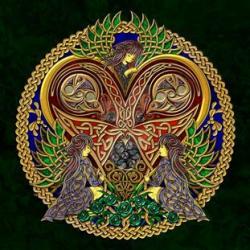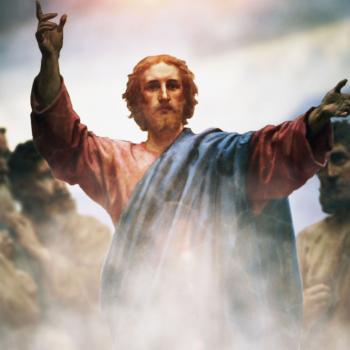 One of the unique marks of Celtic Christianity is its understanding of the infinity of God. Celtic peoples had taken from the pagan backgrounds, a belief in the divine of the ordinary. They interpreted this to mean in the Christian setting that the infinite God was to be found everywhere. And as such, God was a blessing to all things.
One of the unique marks of Celtic Christianity is its understanding of the infinity of God. Celtic peoples had taken from the pagan backgrounds, a belief in the divine of the ordinary. They interpreted this to mean in the Christian setting that the infinite God was to be found everywhere. And as such, God was a blessing to all things.
God was found in the bog. The God of the Universe was to be found in the sound of waves crashing over the beach. The Holy Spirit could be found in the mountain tops or in the clover on the ground. Celts believed God was everywhere. They also seemed to believe that God also transcended from the ordinary everyday. God transcended into the actions of the ordinary of everyday. Not only was God to be found in the river, but in the fish that swam there. God was found in the bucket of the washerwoman as she washed clothes on the riverbank. To the Celt, God was in every breath, every decision, everything. Even chores!
The Blessing of The Kindling
I will kindle my fire this morning,
In the presence of the holy angels of heaven,
the presence of Ariel of the loveliest form.
In the presence of Uriel of the myriad of charms,
Without malice, without jealousy, without envy.
Without fear, without terror of anyone under the sun,
But the Holy Son of God to shield me.
Without malice, without jealousy, without envy,
Without fear, without terror of anyone under the sun.
But the Holy Son of God to shield me.
God, kindle Thou in my Heart within,
A flame of love to my neighbor,
To my foe, to my friend, to my kindred all,
To the brave, to the knave, to the thrall.
O Son of the loveliest Mary,
From the lowliest thing that liveth,
To the Name that is Highest of all.
The Chore of Kindling
Now although seen now as a task for hunters and people without central ac, kindling was an important duty in an ancient Celtic household. If ones fire was not kindled, one would not keep warm, have a way to cook or even a way to prepare weapons. Nor would there be light by which the house could see at night. Failure to properly kindle and maintain a fire could mean certain death for those in the household. This seemingly benign task was a task that was necessary to the survival of all households. When we understand the importance of some of the simplest of chores, we also find why the Celt saw God in everything, including their daily chores.
First, the person making the fire and saying this prayer is stating the importance of doing this job right and as if it were to God. The fire maker, likely a matriarch saw this task as so important it was as if it was worship coming from the holy angels. Also, not just any angels, but archangels! And because this was as a high praise or worship to God, the task was to be carried out as a high honor. The Celts believed that if it wasn’t worth doing it as if it were for God, it was not worth doing.
There is then a discussion of the proper attitude of doing such chores as unto the Lord. These chores were not to be from a place of anger, malice or even necessity. These chores and specifically this one was to be done with a heart free of such things. The person kindling the fire should do it because of the honor doing such a thing for a family would bring unto the Lord.
We Cant Be Bothered…
In our day and age, we just don’t like to be bothered. We begrudgingly throw change in the offering plate. And then avoid the eye contact of the beggar. We only give if it is Facebook Official in a selfie. It seems we no longer do the actions of the gospel from a place of service. We do it from a place almost loathing having to do such things.
This is a fundamental and dangerous shift in the Christian faith. Doing acts of service and worship “because we have to” leads to an apathetic faith that comes out flat and accomplishes little. This is because we are doing things from a place of guilt or tradition and not from a place of love for Jesus Christ.
Like the blessing above, we need to reengage what it means to actually do something as if it was unto God. We need to conduct our lives as if the infinite God of creation were everywhere in it. Because in reality that’s the only place an infinite God can be, everywhere. Imagine what the world would look like, or just your local church, if we started treating our daily tasks as if they were angelic worship to God? Imagine the goodness and kindness that would spread from cheerful giving, loving the unlovable and caring for the least of these. I would argue that would be heaven on earth.
Thin Places
The Celts believed in Thin Places. These were places where the veil between heaven and earth were thinnest. It could be a breathtaking mountain view, and ocean view or even a memorable place in your past where you felt loved. These thin places exist all around us. My challenge to the reader is this:
You may have thin places in your life. But are you willing to do a joyful work to create a thin place for the hurting of this world? Do your actions in the mundane bring anyone closer to heaven on earth? It is my prayer we would not only seek put the thin places in our lives. But are we willing to do the mundane at the highest level to create a blessing for someone else? The Blessing of a thin place for someone else is a way to bring back to the chaotic.
To learn more about Celtic tradition or the author- Click here














